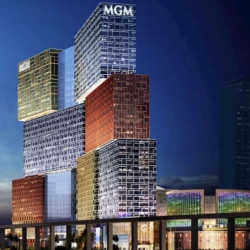
The allotment of gaming tables by Macau officials will have a key role in determining the success of MGM Cotai.
MGM Resorts has delayed the opening date for the MGM Cotai for a third time. The Las Vegas casino company now plans to open its $3.1 billion resort on the Cotai Strip in Macau in the second half of 2017.
MGM China Holdings Limited announced in August 2015 it would open the integrated casino-resort in the final months of 2016. Later, the grand opening was pushed back to Q1 of 2017. This past summer, the date was delayed to Q2 of 2017, with vague references to “the demands of the market” for the delays.
Set to Eclipse the MGM Macau Numbers
The casino company owns the MGM Macau, a 35-story, 600-room hotel and casino in the former Portuguese colony on the southern coast of China.
The MGM Cotai is meant to be a massive expansion of the company’s gaming operations in Macau, the world’s largest gaming destination. The new resort is set to have 1500 hotel rooms, 500 gaming tables, retail shopping, a luxury spa, major restaurants, and a theater.
MGM Holdings Cites “Complexity of the Design”
In a press statement this week, MGM China Holdings stated, “Given the complexity of the design of MGM Cotai and the company’s commitment to a successful opening that reflects the demands of the current market, the expected opening time of MGM Cotai will be adjusted from the second quarter of 2017 to the second half of 2017.”
The delay appears to center around table game allotments. While the MGM Cotai has room for 500 gaming tables, that might not be the plan Macau officials have for the new development.
G3Newswire reported that the MGM Cotai has not secure permits for gaming tables, which drive revenues in Macau. While slot machines are the main revenue source in American and Australian casinos, baccarat tables drive the action in Macau.
Grant Bowie Statement
Grant Bowie, the CEO of MGM China Holdings, said in an August 2016 statement that the Cotai Peninsula casino would premiere with only mass-market gaming tables. No VIP gaming would be involved in the grand opening, at least.
Macau gaming officials want to limit growth of their casino economy to 3% per year, after a December 2014 speech from President Xi Jinping that the city should diversify its economy away from casino gambling. Since then, Macau officials have limited the table game allotments in new casinos, while passing laws which had a withering effect on casino gambling — such as the anti-smoking laws.
On a national level, the Beijing government has cracked down on junket operators, while limiting credit card transactions for UnionPay, the largest credit card company in China.
Parisian Macau and Wynn Palace Openings
The opening of the Las Vegas Sands’ Parisian Macau in September and Wynn Resorts’ Wynn Palace in August is thought to have had an effect on earlier decisions regarding the MGM Cotai. With those multi-billion dollar gaming resorts opening in late-2016, they might have represented all the growth Macau officials might have wanted for the 2016 fiscal year.
Those two casinos helped boost VIP gaming revenues by 13.6% over the final three months of the year. The mass market revenues increased by 7% over the final three months of 2016. Since the first 9 months of the year continued a 26-month decline in gaming revenues, the late-2016 boost likely accorded with an overall 3% growth rate for the casino industry.
Sanford Bernstein: MGM Cotai Delay Is a “Strategic Positive”
With that in mind, opening in the second half of 2017 would allow MGM Cotai to post similar revenue boosts in late 2017. The market research and brokerage firm, Sanford Bernstein Company, said as much in a recent report which stated, “The delay in opening MGM Cotai property is likely a strategic positive in that a later opening should meet a stronger market and more competitive landscape.”
If Macau officials want to limit the year-to-year growth by a certain percentage, then it might make sense to push back the grand opening to later in the year. If the revenues are going to be similar with a Q2 or a Q4 opening, it makes sense to delay the opening to a later date, to save on labor costs and other operating expenses.
A couple of things are all-but-certain. One, the MGM Cotai is not going to receive the 500 gaming tables it hopes, because Las Vegas Sands and Wynn Resorts was disappointed in their table allotments — which were limited to about half as many tables. Two, the longer MGM Cotai waits in the year, the more tables it might receive. In the end, the table allotment is the key to driving mass market revenues, so “strategic positive” is a good phrase to describe the delay.
